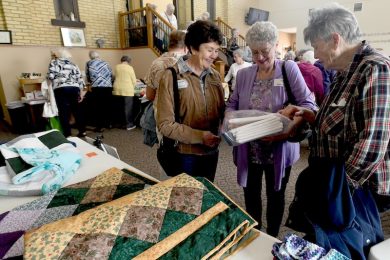This summer, Benedictine Sisters Delores Dufner and Christine Manderfeld published books of hymns and other sung prayers.

Sister Delores, a nationally renowned hymn writer, said, “Writing hymns is my vocation within a vocation. With 34 new pieces, ‘Never Silent in Your Praise’ is my fifth hymn collection.”
Many of her texts are inspired by the day’s liturgy and Scriptures. Before the Liturgy of the Hours or the Eucharist, she often reads the words of the hymn that the community in St. Joseph will be singing.
“I like reading the text beforehand, so I can pray it better when I sing it,” Sister Delores said. “Otherwise, the words go by too fast to get the full meaning.”
The title song of her new collection was inspired by a phrase from a psalm.
She said, “One morning we prayed, ‘You changed my anguish into this joyful dance … that my life might sing your glory, never silent in your praise.’ That clicked. Each of my verses amplifies aspects — ‘Ever joyful … ,’ ‘Never weary …’ and ‘Ever thankful in your praise.’”
Benedictine Father Anthony Ruff commissioned that piece to bless Saint John’s Abbey’s expanded organ. He invited Sally Ann Morris to write new music for the text; she sent two possibilities.
“After we chose one,” Sister Delores said, “I liked the second tune so much that I wrote a new text for it — ‘Who Has Seen and Not Been Humbled by the Beauty of This Place?’ I wanted to motivate people to cherish and preserve God’s wonderful creation.”
Current events also inspire her texts.
“I wrote ‘Tender-Hearted God of Mercy’ about the plight of refugees and immigrants who hope the Statue of Liberty will welcome them,” she said. “The text reminds people of our history and, I hope, awakens us to greater compassion for refugees.”
Once she has the idea for a text, she chooses a tune to express that spirit — about half are public domain tunes and half are set to newly composed music.
“The tune helps me to come up with a word or phrase to echo in every stanza,” Sister Delores said. “I ask myself if my community will be able to pray it. The parishes — will they want to sing it? What about other Christian churches? I try to make it as broad as possible.”
Others contribute insights
“My blood sister, Angeline Dufner, who’s no longer with us, taught English at the College of Saint Benedict. Besides punctuation and usage, she’d identify places where people wouldn’t understand what I was trying to say.”
A theology professor considered what her text said about God. A spiritual director spotted words that raised difficult emotions for those who’d experienced great pain.
And Sister Christine would notice if a word didn’t sing very well.
“Sister Christine is such a splendid musician,” Sister Delores said. “We began college together and have been friends ever since.”
Sister Delores said, “In 1979, I was doing lectio with the Gospel of John, where Jesus says at the Last Supper, ‘I am the vine and you are the branches.’ The words started singing themselves in my head. I wrote them down — my first hymn. Then, when my father died in 1983, my therapy was writing funeral hymns, which helped express my faith in the Resurrection.”
She began to be published. For a stronger background in Scripture, theology and liturgy, she took courses at Saint John’s School of Theology and then obtained a master’s degree in liturgical studies at the University of Notre Dame.
“In 1994, Oregon Catholic Press published a collection of my hymns titled “Sing a New Church.” I asked that the words be printed separately on the left side, like a poem, so people could more easily see what it was saying. On the right side, the text was interlined with the music. That’s how all my collections are published now.”
“Sing a New Church,” the title song of her first collection, expressed the ideal of the Church’s renewal according to the teachings of the Second Vatican Council.
Sister Delores said, “I was honored to be invited to a gathering in Chicago celebrating the 30th anniversary of Vatican II, and thrilled when the participants sang my hymn with obvious enthusiasm and commitment.”
A theologian who admired her work said that her hymns finish with an exclamation point.
“That’s the energy I want,” Sister Delores said. “Hymns aren’t just something pleasant that happens at church — I want my hymns to energize people for their Christian life.”
Singing deepens prayer
“Sing of God’s Goodness: Calls to Worship and Responsories, Volume 1,” is Sister Christine’s first publication with GIA in Chicago. Her second volume will come out this autumn.
“Singing of God’s goodness fits our Benedictine community. We sing our prayers more than we recite them,” Sister Christine said. “When you sing the words to beautiful music, the meaning goes deep and is very powerful. We use the calls to worship at morning prayer, which is often about the beauty and goodness of creation.”
Sister Delores said, “Sister Christine wrote most of the music for us at the monastery. We’ve sung all of it except for a few new pieces composed especially for this collection. She’s been a composer-in-residence for us. We love her music.”
While Sister Christine’s music was originally composed with her Benedictine community in mind, she said the sung prayers can be used with any faith-based group to begin a meeting, choir practice or social event.
“They can also be prayed by families or individuals,” she said. “We purposely made these pieces easy and they don’t need accompaniment.”
One of Sister Christine’s favorite responsories in the collection is “Enlighten Us, Loving Father,” inspired by a quote from Pope John Paul 1: “God always keeps watch over us, even when it seems to be night. He is a Father, but even more a Mother.”
She said, “My mother devised unique ways — to teach me to hear and sing thirds and want to practice piano. After I’d composed my first piece in seventh grade, she encouraged me to compose more. Once at a concert together, I asked her if the song we’d just heard was beautiful. My mother said, ‘Look at the goosebumps on my arms.’”
Of her process, Sister Christine said she tinkers with the accompanying chords. With a psalm about suffering, she wouldn’t choose a bright major scale or eighth notes running up and down, but instead a slower tempo, maybe a bit of dissonance.
“I try to make melodies that are lovely, but not as an end in themselves — the text is always my starting point.”
To purchase:
“Never Silent in Your Praise” and “Sing of God’s Goodness” are available at Whitby Gift Shop at St. Benedict’s Monastery, 104 Chapel Lane in St. Joseph. 320-363-7100. www.sbm.osb.org. They are also available from GIA Publications at https://www.giamusic.com/store/sacred-music/.




















